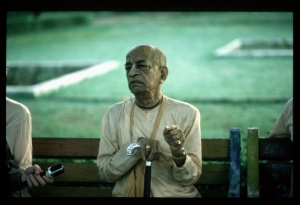BG (1968) A Note of Appreciation for This Volume

A.C. Bhaktivedanta Swami Prabhupada
A NOTE OF APPRECIATION FOR THIS
VOLUME FROM DENISE LEVERTOV
Swami Bhaktivedanta's disciples in New York dance and chant Hare Krishna—Hare Rama with an honest, simple fervor that is very moving. Talking to a young devotee, I was somewhat appalled by his fundamentalism, yet at the same time I felt a reverence for his gentleness, and saw an unassailable radiance in his eyes. I listened to the recording of the Swami himself chanting the Hare Krishna mantra and recognized that he pronounced each syllable with what in Hebrew is called Kavronah—that is, prayerful understanding, the opposite of a mere mechanical repetition. What lies in back of these evidences of a strong spiritual life?
Most people of any education know at least the name of The Bhagavad Gita, and many have read at least some of it in one of the several available translations. But it is not as yet, I think one can agree, a common part of our cultural milieu—that is, it is not absorbed and incorporated into our lives to any extent. And this is probably less because it is alien per se than because we have lacked just the kind of close interpretive commentary upon it that Swami Bhaktivedanta has here provided, a commentary written from not only a scholar's but a practitioner's, a dedicated lifelong devotee's, point of view.
Being, myself, what could best be described as a syncretist, I cannot subscribe to the belief in the exclusive wisdom of The Bhagavad Gita which some, at least, of the Swami's adherents seem to hold (I am thinking here of the same young man whose gentleness and shining eyes impressed me so favorably). And as a believer in political activism I naturally wonder if the disciples of the Krishna Consciousness movement, who believe as I also do in non-violence, are not nevertheless too passive in their at titude to the war and to social injustice. But even if that is so, I feel certain that they do have something in their lives that is of inestimable value: an inner serenity that makes them better, kinder human beings than, in all probability, they were before they arrived at their present beliefs. And though I cannot believe that any one religion or any of the "wisdom books" of any cultural tradition possesses a monopoly of the truth, yet my sense that the study of The Bhagavad Gita would be valuable for thinking people, in this time of extreme crisis especially, arises more from the little I have seen of the changed lives of those who do study it than from the mere received knowledge that it is considered one of the great spiritual texts.
Apparently devotees take quite literally the story of the Battlefield of Kurukshetra where Arjuna receives divine wisdom directly from Krishna, who has taken on the form of his Charioteer. Many—like myself—will take this symbolically, not literally, and look on it as a soul-story, in which the battlefield is interior and the God who speaks is the God within us. It surely doesn't matter very much whether one is a fundamentalist or, instead, considers this book to be yet another of mankind's metaphors of individuation and regeneration, if through it we live more fully.